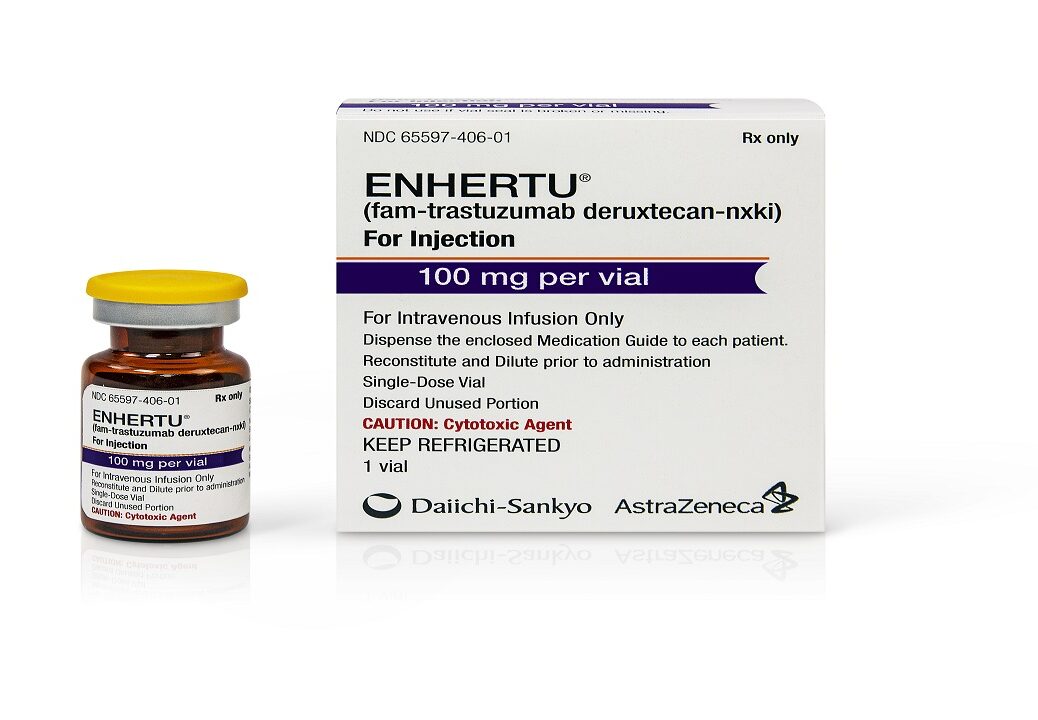Fam-trastuzumab deruxtecan-nxki is approved by FDA for breast cancer
April 2022: Adult patients with unresectable or metastatic HER2-positive breast cancer who have received a prior anti-HER2-based regimen either in the metastatic setting, or in the neoadjuvant or adjuvant setting and have developed disease recurrence during or within 6 months of completing therapy have been given fam-trastuzumab deruxtecan-nxki (Enhertu, Daiichi Sankyo, Inc.) by the Food and Drug Administration.

DESTINY-Breast03 (NCT03529110) was a multicenter, open-label, randomised trial that enrolled 524 patients with HER2-positive, unresectable, and/or metastatic breast cancer who had previously received trastuzumab and taxane therapy for metastatic disease or had disease recurrence during or within 6 months of finishing neoadjuvant or adjuvant therapy. Patients were given Enhertu or ado-trastuzumab emtansine intravenously every three weeks until intolerable toxicity or disease progression. Hormone receptor status, prior pertuzumab treatment, and visceral illness history were used to stratify the randomization process.
Progression-free survival (PFS) was the primary efficacy outcome measure, as determined by a blinded independent central review using the RECIST v.1.1 scoring system. The primary secondary outcome measures included overall survival (OS) and verified objective response rate (ORR). The Enhertu arm had a median PFS of not achieved (95 percent confidence interval: 18.5, not estimable) and the ado-trastuzumab emtansine arm had a median PFS of 6.8 months (95 percent confidence interval: 5.6, 8.2). The hazard ratio was 0.28 (95 percent confidence interval: 0.22 to 0.37; p=0.0001). 16 percent of patients had died at the time of the PFS study, while the OS was still in its infancy. The Enhertu arm had an ORR of 82.7 percent (95 percent CI: 77.4, 87.2) at baseline, while those receiving ado-trastuzumab emtansine had an ORR of 36.1 percent (95 percent CI: 30.0, 42.5).
Nausea, exhaustion, vomiting, baldness, constipation, anaemia, and musculoskeletal discomfort were the most common adverse events (incidence >30 percent) in patients taking Enhertu. Vomiting, interstitial lung disease, pneumonia, pyrexia, and urinary tract infection were serious side effects in more than 1% of patients who got Enhertu. A Boxed Warning on the prescribing instructions warns doctors about the possibility of interstitial lung disease and embryo-fetal damage.
Enhertu is given as an intravenous infusion once every three weeks (21-day cycle) until disease progression or unacceptable toxicity.
View full prescribing information for Enhertu.
Susan Hau is a distinguished researcher in the field of cancer cell therapy, with a particular focus on T cell-based approaches and cancer vaccines. Her work spans several innovative treatment modalities, including CAR T-cell therapy, TIL (Tumor-Infiltrating Lymphocyte) therapy, and NK (Natural Killer) cell therapy.
Hau's expertise lies in cancer cell biology, where she has made significant contributions to understanding the complex interactions between immune cells and tumors.
Her research aims to enhance the efficacy of immunotherapies by manipulating the tumor microenvironment and exploring novel ways to activate and direct immune responses against cancer cells.
Throughout her career, Hau has collaborated with leading professors and researchers in the field of cancer treatment, both in the United States and China.
These international experiences have broadened her perspective and contributed to her innovative approach to cancer therapy development.
Hau's work is particularly focused on addressing the challenges of treating advanced and metastatic cancers. She has been involved in clinical trials evaluating the safety and efficacy of various immunotherapy approaches, including the promising Gamma Delta T cell therapy.
- Comments Closed
- May 5th, 2022



Daiichi Sankyo, Enhertu, fam-trastuzumab deruxtecan-nxki
CancerFax is the most trusted online platform dedicated to connecting individuals facing advanced-stage cancer with groundbreaking cell therapies.
Send your medical reports and get a free analysis.
🌟 Join us in the fight against cancer! 🌟
Привет,
CancerFax — это самая надежная онлайн-платформа, призванная предоставить людям, столкнувшимся с раком на поздних стадиях, доступ к революционным клеточным методам лечения.
Отправьте свои медицинские заключения и получите бесплатный анализ.
🌟 Присоединяйтесь к нам в борьбе с раком! 🌟